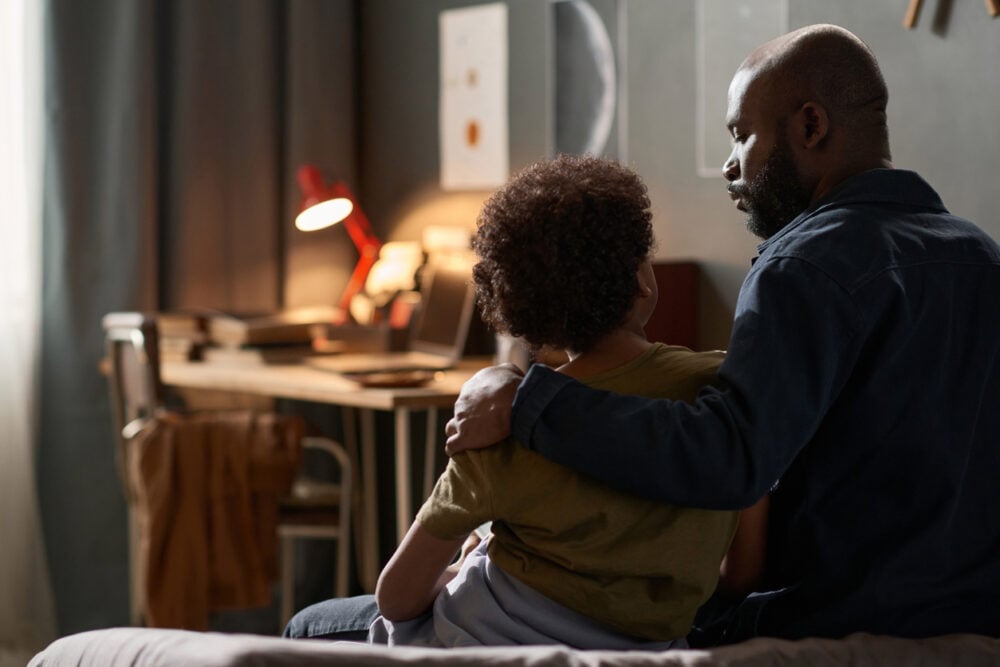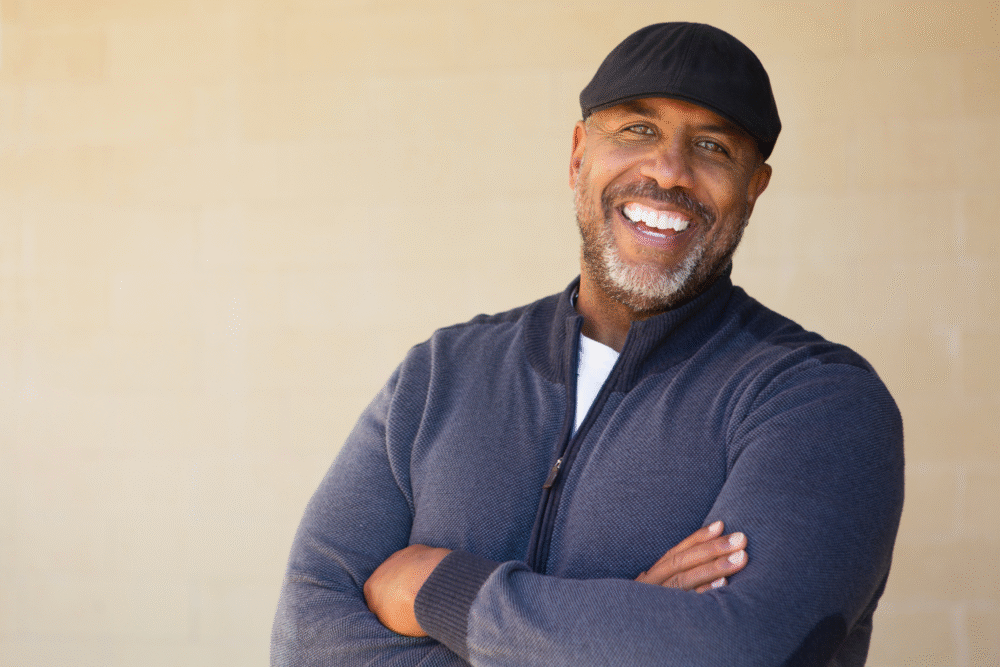Men are finally opening up—and the ripple effects are changing lives.

For generations, men have been taught to tough it out, to bottle emotions, and to see vulnerability as weakness. But that outdated script is finally being rewritten—and the shift is profound. As more men start opening up about their emotional struggles, they’re not just improving their mental health—they’re transforming their relationships, their sense of purpose, and even their physical well-being.
Talking about emotions isn’t just some trendy wellness fad—it’s a deeply human act with real ripple effects. When men allow themselves to feel, express, and process, they unlock parts of life they didn’t know they were missing.
1. Relationships instantly become more real and connected.

When men start talking honestly about their emotions, their relationships deepen fast. That wall of “I’m fine” finally drops, and people feel like they’re engaging with the real person—not some performance. Whether it’s with a partner, a parent, or a friend, honest emotional expression invites the same in return. Conversations become more meaningful.
There’s less guessing and more trust. And even conflict feels less threatening because it’s grounded in real feelings, not defensiveness. The fear that vulnerability will push people away is replaced with the truth: it’s the glue that pulls relationships closer and makes them stronger.
2. Physical health issues start to improve.

It might sound surprising, but bottling up emotions takes a toll on your body. Men who finally begin expressing how they feel often notice headaches, muscle tension, and gut issues start to ease. That’s because chronic stress—fueled by emotional suppression—messes with everything from blood pressure to immune function.
Talking about hard feelings doesn’t just unload mental weight; it gives your nervous system a break. And once that chronic fight-or-flight mode starts to fade, your body begins to repair itself. Sleep gets better, energy returns, and even blood work might look less ominous. Your doctor may notice before you do.
3. Anxiety loses its constant grip.

For a lot of men, anxiety hides under anger, irritability, or the urge to control everything. But once they start naming and expressing the actual emotions underneath, the anxiety starts to loosen its hold. Talking about sadness, fear, shame, or guilt might feel terrifying at first—but it’s incredibly freeing. Avoiding these emotions gives them more power. Facing them disarms them.
Men often report feeling like they can breathe again once they stop trying to manage it all silently. And once they realize they don’t have to have all the answers or keep it all together, the inner calm kicks in.
4. Old traumas finally start to heal.

You can’t heal what you won’t feel. And for many men, childhood wounds or past traumas stay buried under years of silence. But when they start opening up—maybe in therapy, in a support group, or even just to a trusted friend—those old injuries finally get the attention they need. Talking through pain doesn’t erase it, but it does transform it.
Memories stop being landmines. Emotional triggers start making sense. And the grip of the past loosens. Many men describe feeling like a different person once they’ve unpacked trauma they didn’t even know was still running the show in the background.
5. Fatherhood becomes deeper and more intentional.

When men talk about their emotions, their parenting changes too. They become more attuned to what their kids are feeling, more willing to model emotional honesty, and less likely to repeat the “boys don’t cry” nonsense they were raised with. Dads who are open about their emotions create space for their kids to do the same.
That means fewer tantrums, more connection, and children who grow up emotionally literate instead of emotionally shut down. Plus, fatherhood becomes more joyful when men allow themselves to fully engage, feel, and show up with their whole hearts—not just as disciplinarians or providers.
6. Friendships become more meaningful and supportive.

It’s no secret that many adult men struggle to maintain deep friendships. Surface-level banter is fine, but it doesn’t sustain you during life’s hard chapters. When men start expressing their emotions, their friendships evolve. Vulnerability begets vulnerability. Suddenly, the group chat includes check-ins, not just memes.
A beer with a friend turns into a conversation that actually helps. And those deeper connections become a lifeline during divorce, loss, job stress, or personal crises. Emotional expression doesn’t make friendships weird—it makes them real. And in a world full of shallow interactions, that depth is exactly what many men have been missing.
7. Emotional intelligence increases without even trying.

Once men start regularly talking about their feelings, they become more emotionally aware—not just of themselves, but of others too. They start to notice subtle shifts in tone, body language, and unspoken signals they used to overlook. They become better listeners. They learn how to respond instead of react. And they start making decisions that are emotionally informed, not just rationalized or impulsive.
This natural increase in emotional intelligence isn’t something you have to study or force—it’s a byproduct of being emotionally honest. And over time, it spills into every area of life, from leadership roles to romantic relationships.
8. The pressure to be “the rock” disappears.

A lot of men carry this unspoken burden to be the strong, stoic one in every situation. They feel like they can’t fall apart—even a little—without letting someone down. But when they start opening up about their emotions, they realize they don’t have to be the rock all the time. They can be human.
And surprisingly, that doesn’t make others lose respect—it makes people feel safer. Because no one expects perfection, just presence. Sharing fears, sadness, or uncertainty actually builds credibility. And once that pressure lifts, men feel lighter, more balanced, and finally free to show up as their full selves.
9. Self-worth stops depending on performance.

Men are often taught that their value comes from doing—achieving, providing, winning. But when they begin expressing their inner emotional world, they reconnect with their intrinsic worth—just for being human. They no longer measure themselves solely by success, productivity, or how much they earn. They realize that being present, being honest, and being kind to themselves matters more than checking boxes.
This shift can be life-changing. It softens the inner critic and builds real self-respect. And instead of constantly hustling for validation, they learn to rest in the truth that they are enough—even on the days when they feel broken.
10. Life finally starts to feel like it fits.

When men suppress emotions, life can feel disconnected and numb—like they’re moving through someone else’s story. But when they start expressing what’s really going on inside, life begins to feel aligned. They make choices that reflect their actual values. They speak up instead of swallowing resentment. They pursue relationships and work that nourish them, not just impress others. It’s like the internal compass finally starts working.
Life feels more honest, less exhausting. There’s less pretending, more peace. And while the journey of emotional growth isn’t always easy, it leads to something most men didn’t even realize they were craving: wholeness.
11. Depression starts to lose its invisibility.

Depression in men often hides behind silence, sarcasm, or withdrawal. It doesn’t always look like sadness—it shows up as numbness, anger, or burnout. But once a man starts talking about his emotions, the fog begins to lift.
Even just naming the heaviness out loud helps deflate its power. What felt like an endless downward spiral starts to become something manageable—something he can understand and respond to, not just endure. And with the right support, many realize they aren’t broken—they’re human and overwhelmed. Emotional expression becomes a lifeline, not a liability. It opens the door to healing, connection, and hope.
12. Romantic relationships stop feeling like emotional minefields.

When men don’t share what they feel, their partners often fill in the blanks—and they usually assume the worst. Resentments build, communication breaks down, and love starts to feel confusing or strained. But once men start expressing their emotions honestly, relationships shift. Their partners no longer feel shut out. Misunderstandings decrease. Emotional intimacy increases. And conflict stops being a threat and becomes a doorway to growth.
Men realize that showing their vulnerable side isn’t a weakness—it’s a powerful gift. It builds trust, fosters closeness, and deepens love in ways that silence never could. The relationship becomes a true partnership.
13. They become role models for the next generation.

Every man who opens up emotionally is rewriting the script for those who come after him—sons, nephews, students, younger coworkers. By showing that it’s okay to talk about pain, fear, or confusion, they give others permission to do the same.
This ripple effect is powerful. Emotional courage is contagious. And in a culture where many boys still learn to toughen up and shut down, seeing a man model emotional intelligence can be life-changing. It says, “You don’t have to suffer alone.” It says, “Being human is strong.” And that quiet modeling might just be one of the most lasting legacies a man can leave.
